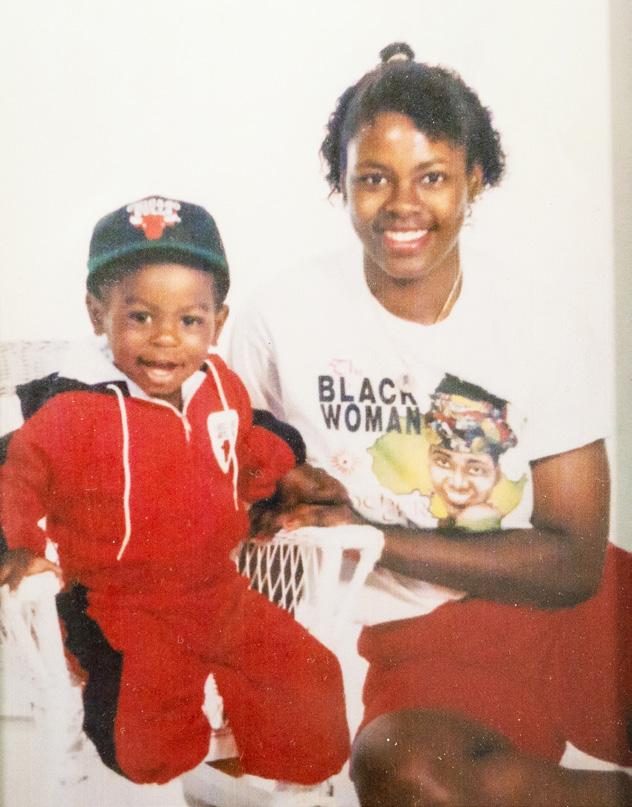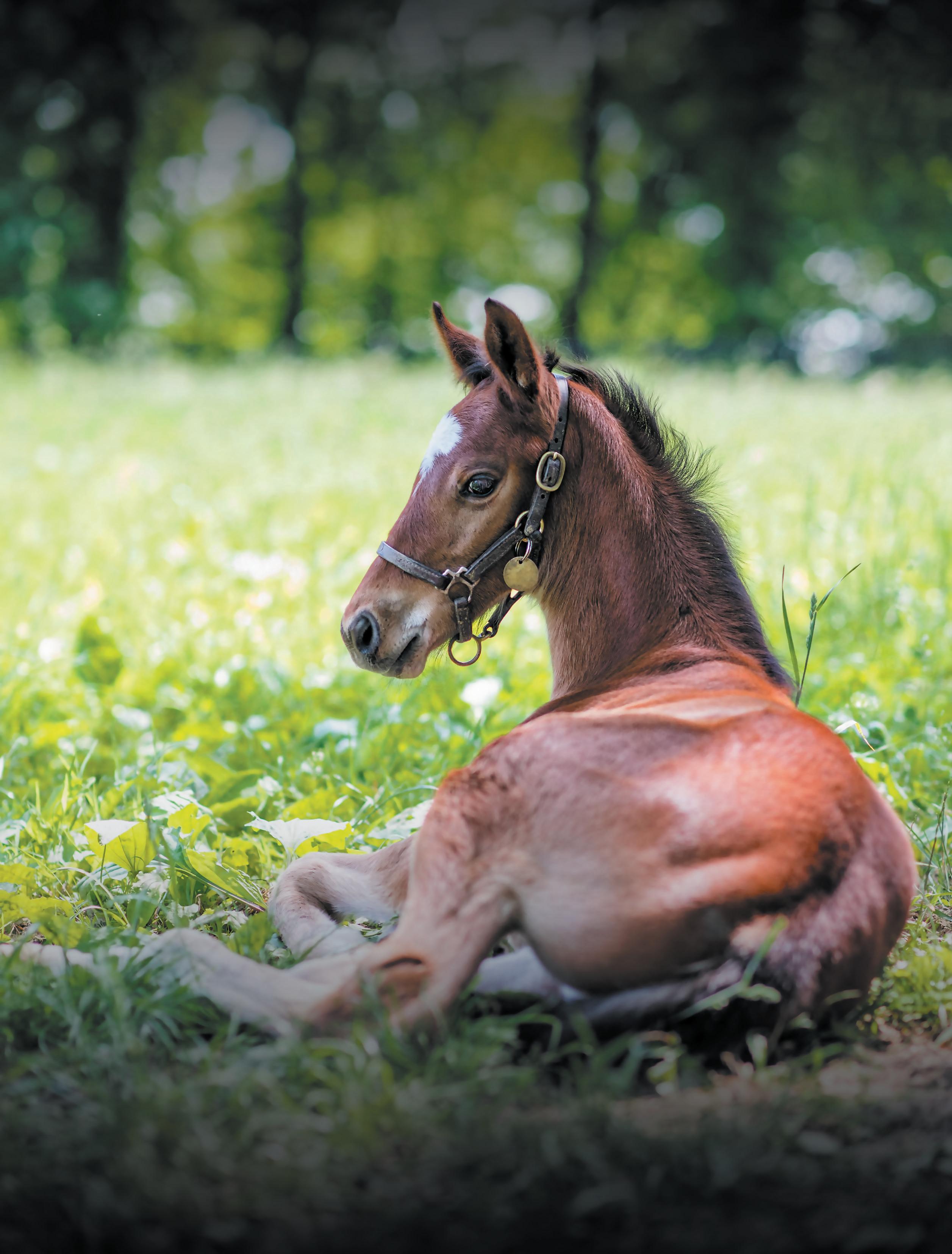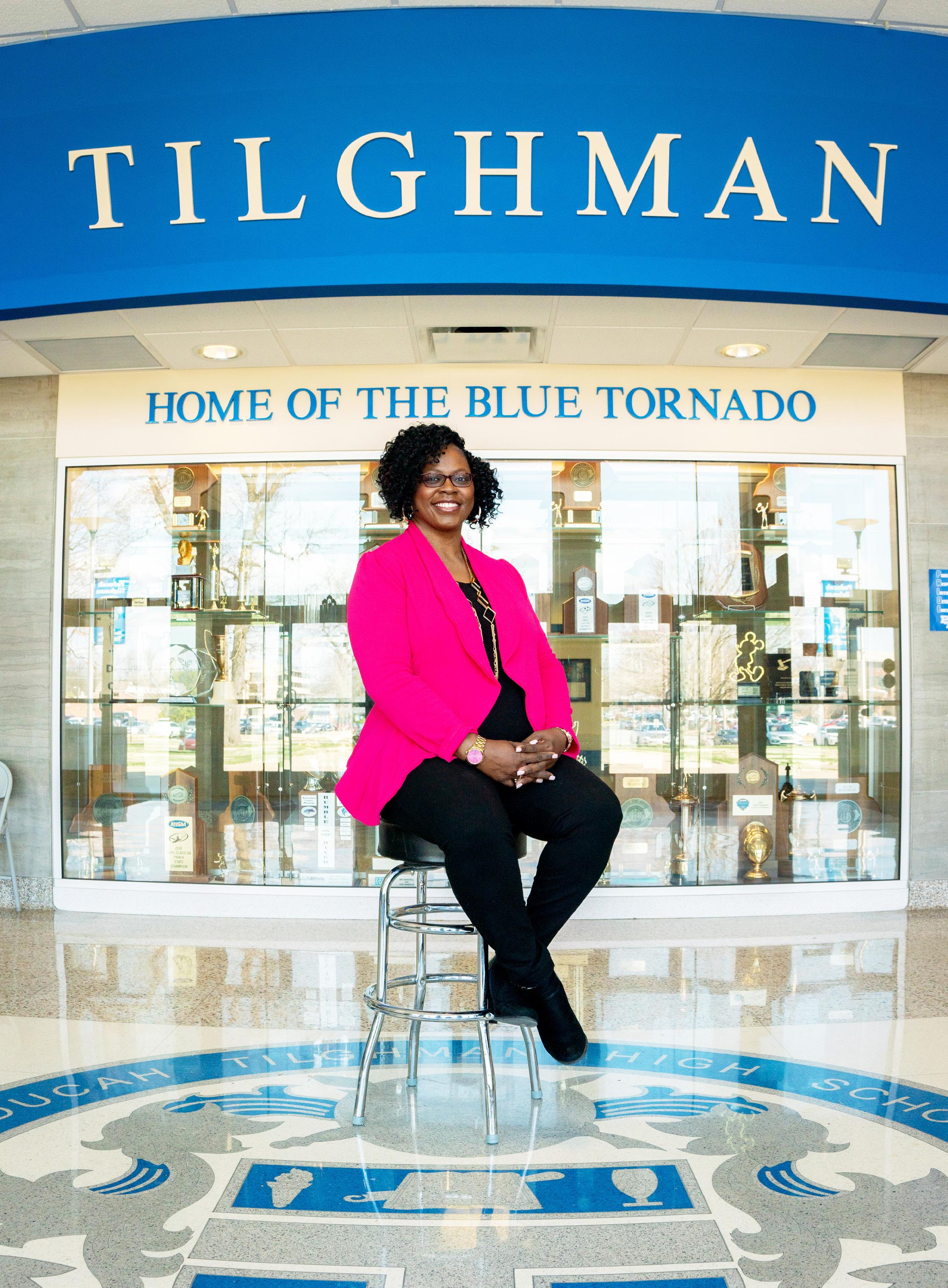
9 minute read
Shonda Burris Looks Back on Her Local Life
It Takes a VILLAGE
From a “rusty fork and a food stamp,” Shonda Hollowell-Burrus has found that the most life-giving fare comes from simple seeds planted all along the way
H
by Stephanie Watson
WHEN SHONDA HOLLOWELL-BURRUS returned to Paducah in 2019, it had been 25 years since she called the city home. “When I walked back into Tilghman for the interview, I was trying to keep it together,” she explains. “All the memories came flooding back.” Shonda was interviewing to be Dean of Students at Paducah Tilghman High School, a complex position that includes variations of counseling, discipline, staff leadership, and student advocacy. This was a job that would bring her life’s work and life story full circle. Shonda, who describes her upbringing as “far from a silver spoon and luxury living” and more comparable to a “rusty fork and a food stamp,” primarily spent her formative years in the subsidized housing community of Elmwood Court. “I have some of the greatest memories and some of the best friends from there,” Shonda notes.“We didn’t know we were poor. We were just kids having fun. What we didn’t have in finances, we made up for in the richness of our village. We took care of each other.” This community taught Shonda to be humble, respectful, and to work hard. When she became pregnant during high school, it was also this community, along with her aunt, stepmom, and dad, that stepped up and helped her to complete a hugely successful high school career at Paducah Tilghman (PTHS). As a senior, her accolades included homecoming queen, Outstanding Physical Education Student of the Year, Senior Superlative “Most Athletic,” Student Council representative, and basketball, cologuard, and softball team captains. She also maintained a job at Chuck-E-Cheese while raising her two-year-old son, Michael. After graduation, Shonda moved to California, where she lived, raised kids, and built her career in education. While there, she obtained degrees in child development, human development education, and school counseling. Like most things she’s done, she excelled at each step of this journey. Awards and accolades for her work abound, and in 2017 she was even awarded California State Educator of the Year for her work in counseling at the Murrieta Valley Unified School District, located about midway between Los Angeles and San Diego.
S
HONDA HOLLOWELL-BURRUS
Despite the success Shonda found over the years in California--and the milder weather--she felt it was time to come home and serve the students she so deeply understands. “I didn’t always have the social skills I needed, but there were people—particularly teachers at PTHS—who didn’t see the pregnant girl from Elmwood Court. They saw the potential of who I could be. That’s what I want to give back,” she explains. Giving back is exactly what she’s doing. Last year, districts across the state added administrative positions whose goal would be to tackle issues of equity and inclusion in the schools. Paducah Public Schools joined that group, adding the position of chief equity officer. After two years as dean of students, Shonda found herself at the interview table once again. She was a perfect fit. Shonda’s work involves making sure all students, even the ones with “humble beginning,” have an equitable chance to succeed in life. “If you go off of the four-page job description,” she laughs, “you will see that the job was created with the intention of auditing equity, diversity, and inclusion in our district so that we can allow all students to achieve. Despite good intentions, our practices haven’t always served us well. We’re working to do better.” The creation of this position is one step the district has taken in response to the results of an equity audit performed last year by Dr. Greg Vincent and Dr. Sarah
LaCour of the Education and Civil Rights Initiative of the University of Kentucky. The audit examined several aspects of equity within administration and individual schools, including discipline, course enrollment, and achievement data. Among its many insights, the audit found issues of academic opportunity and access, specifically regarding minority representation in advanced courses, equal access to gifted and talented programs at the elementary level, and under-identification of students with special
SHONDA HOLLOWELL-BURRUS
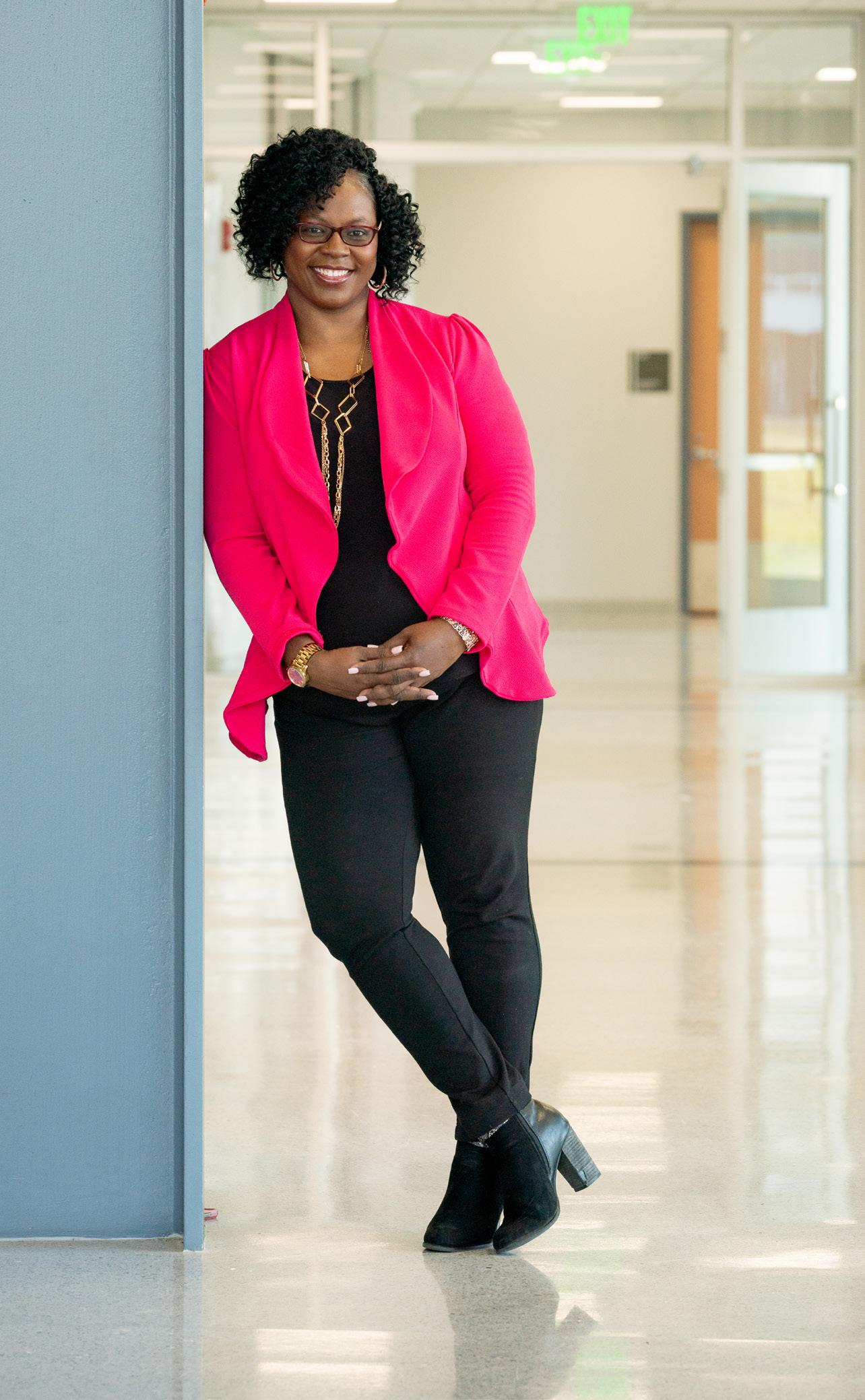
needs. It also found racial disparities in discipline, and an overall lack of trust regarding transparent communication among students, families, and community members. Shonda’s current work is informed by this audit, but, on most days, she finds herself out of her office and into the places where she really learns the most: the classrooms and hallways of Paducah Public Schools. She’s talking to students and staff at all levels about the audit’s findings, and she’s using their reflections on this data to further inform her work. “I’m asking, ‘How do you feel, do you agree or disagree with the results? What do you see in your space regarding these findings?’ It’s not always an easy topic, but let’s talk! Let’s have that discussion so we can move forward for the good of our students,” she says. The district has also formed two new advisory councils to partner with Shonda moving forward. The Paducah Public Schools Equity Advisory Council includes 37 staff members ranging from bus drivers to teachers, principals, and cabinet members who are examining audit results to plan professional development and district initiatives for next year. The second advisory council, The Student Equity Advisory Council (SEAC), is composed of 16 high school students from Paducah Tilghman. These student leaders come from a wide array of backgrounds and will collaborate on ways to enhance diversity, equity, and inclusion. Recently, this group of students participated in reparative justice conversations with students from McCracken County Schools. The two Student Equity Advisory councils are working together to break boundaries and create unity where there once was division. “If you could have been in that room hearing these kids talk,” Shonda explains, “you would have been floored. The mature way in which they are talking openly and constructively about issues adults even struggle to tackle is mind blowing. We have so much to be proud of.” According to Shonda, this type of collaboration is paramount to finding growth.“This isn’t an isolated job or journey,” she states. “We all play a role in doing better and being better. The district’s mission statement is to know each child by name and need. This work is the next step in living up to that mission.”
THE KIDS ARE ALL RIGHT
Shonda Hollowell-Burrus has spent a lifetime mentoring and molding young lives both inside and outside of the schoolhouse. She’s also the kind of person who just doesn’t see the beginning and end of her 9-5 as the real parameters of her work. “When the work you do is the work you most believe in, the rest just falls into place,” she explains. Because of her passion for mentorship, sixteen years ago Shonda started a nonprofit in California called The Black Coal and Roses Society. This “society” provided a place of belonging for young women to learn what it means to be a person of self-worth and strong character while facing the challenges life might bring. Two years ago, she brought this nonprofit to Paducah. “In growing up where I grew up, with life being what it was, there were so many things I didn’t know,” she explains. “I was a teen mom at age 15. Navigating being a child while raising a child was not easy. I wanted to be able to provide opportunities and resources and a stable place for young girls to ask every question I wish I could have asked as a young woman growing up.” The Black Coal and Roses Society, which meets at Washington Street Baptist Church and serves young ladies throughout the county, is both a place of belonging and a place to learn. “We promote sisterhood and service through academic excellence, community service, cultural development, and the fostering of positive peer to peer relationships,” Shonda notes. The symbolism of coal that is refined over time and eventually emerges as a precious stone is an inspiring one for the young women in this group. Along with building a sense of community, the group is learning about everything from self-esteem to career planning, personal hygiene, mental health, and dealing with stress. “There is no question they can’t ask and no topic we can’t discuss,” says Shonda. Along with her work as the Chief Equity Officer, running her nonprofit, and serving as a minister of The Washington Street Baptist Church, Shonda leads the African American Leadership Club (AALC) for Paducah Tilghman. Under her leadership, the group has grown to 63 members and has created a culture of excellence and leadership for Black students.
I
T TAKES A VILLAGE
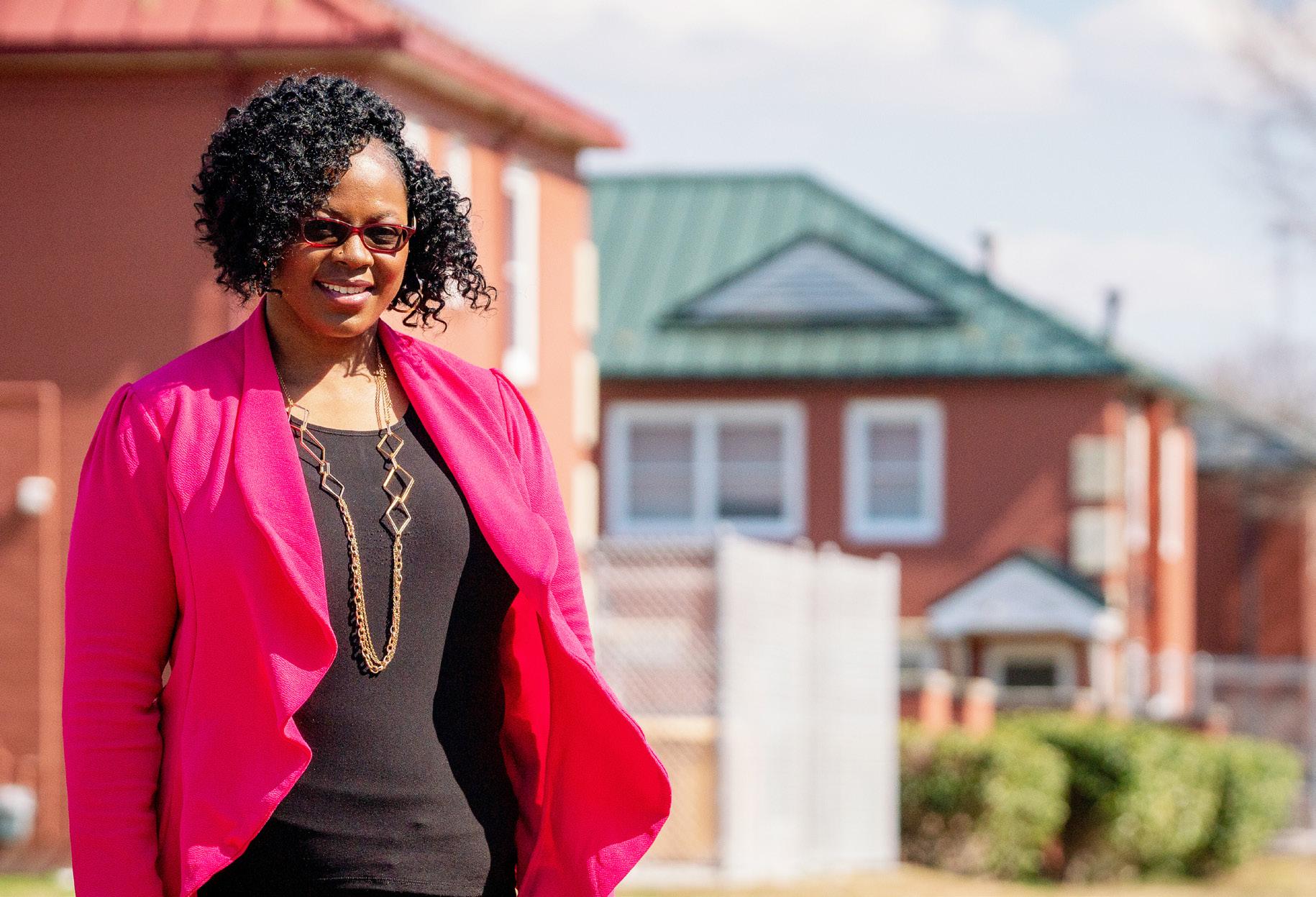
Shonda looks back at the neighborhood where she grew up. RIGHT: Shonda and her son, Michael.
Students in the group regularly plan and lead the meetings, tackling topics they face every day such as toxic masculinity, mental health, and peer pressure. “The leaders in these rooms are alright. Our kids are resilient, smart, empathetic to one another,” she notes with a smile. “When I watch these kids work, I know our kids are going to be just fine.” She is also helping these students connect to the larger world. “When I came home after 25 years, there were so many places in Paducah I had never been,” she explains. “That gives me a charge as the AALC advisor to expose our students to so much more than their current surroundings. I now live 10-15 minutes from where I grew up, and I had never been to this neighborhood until I moved back! Kids who look like me, who grew up like me, I don’t want them to wait until they’re 50 like me to see beyond their neighborhood. I want them to know what they can become regardless of where they live and their socio-economic status.” Shonda is also leaning on other leaders in the community when it comes to meeting this charge. Women of Wisdom and Men of Standard presentations bring in influential African American women and men from the community to mentor students and share their own stories. The group also recently hosted its second annual Black History Celebration this year, a powerful performance which engaged the entire community in sharing the rich history of African Americans contributions and culture. How does she do it all? “I just don’t think about it,” Shonda says. “If I think about it, I’ll get tired, so I just DO.”
